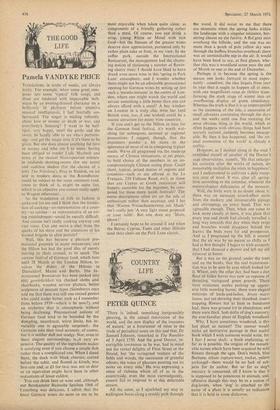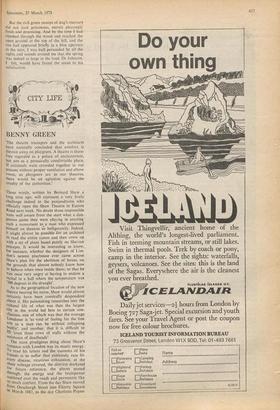COUNTRY • LI FE PETER QUINCE
'There is, 'indeed, something inexpressibly pleasing, in the annual renovation of the world, and the new display of the treasures of nature,' as a forerunner of mine in the trade of periodical notes on this and that, Dr Samuel Johnson, remarked in The Rambler of 3 April 1750. And the good Doctor, in- corrigible townsman as he was, had in mind not the vernal delights of Fleet Street or the Strand, but `the variegated verdure of the' fields and woods, the succession of grateful odours, the voice of pleasure pouring out its notes on every side.' He was expressing a sense of richness which all of us in the countryside, even the most curmudgeonly, cannot fail to respond to at this delectable season.
All the same, as I squelched my way in wellington boots along a muddy path through the wood, it did occur to me that there are moments when the spring lurks within the landicape with a singular reticence, bor- dering almost on the furtive. A flat grey mist overhung the hillside, and the sun was no more than a patch of pale yellow sky seen through the leafless branches overhead; there was an unmistakable nip in the air. It would have been hard to say, at first glance, whe- ther this was a woodland scene near the end of March or one at the end of December.
Perhaps it is because the spring is the season one looks forward to most expec- tantly: somehow, the idea lingers from year to year that it ought to happen all at once, with one magnificent coup .cle thecilre trans- forming the stark stage of winter into an overflowing display of green abundance. Whereas the truth is that it is as imperceptible as the incoming of the tide, a succession of small advances continuing through the days and the weeks until one fine morning the most obvious thing in the world, which as often happens with obvious things had been scarcely noticed, suddenly becomes inescap- able. By then it has happened, and 'the an- nual renovation of the world' is already a reality.
However, as I sloshed along in the mud T reminded myself of another of the Doctor's sage observations, namely, 'He that enlarges his curiosity after the works of nature, de- monstrably multiplies the inlets to happiness'; and I endeavoured to cultivate a duly recep- tive state of mind. It was, after all, spring- ' time according to the calendar, whatever the meteorological deficiencies of the moment.
Well, the birds were in no doubt about it; there was an incessant crowd-effect noise from the rookery and innumerable pipings and chirrupings on every hand. That was agreeable enough. Then, when one came to look more closely at them, it was plain that every tree and shrub had already travelled a long way towards that day when their twigs and branches would disappear behind the leaves; the buds were fat and prosperous. And as I progressed up the hill, it seemed that the air was by no means so chilly as I had at first thought. I began to wish earnestly that I had chanced a shower and left my old raincoat at home.
But it was on the ground, under the trees and on the banks, that the real transforma- tion was to be seen by eyes which looked for it. Where, only the other day, had been a dun floor of fallen leaves was now an expanse of thrusting, variegated green growth. There were miniature nettles pushing up aggres- sive little scowling leaves; there were elegant outcrops of lords-and-ladies, Arum ;mot- Tatum, not yet showing their sheathed, insect- trapping flowers but at least in handsome leaf; there was ground ivy in abundance; and there were thick, lush drifts of dog's mercury, the ever-familiar plant of English woodland.
Why, I have sometimes wondered, is this last plant so named? The answer would make an instructive passage in that useful book which I wish someone would write, for I fear I never shall: a book explaining, so far as is possible, the origins of the remark- able names which have been acquired by wild flowers through the ages. Don's twitch, blue fleabane, ciliate rupture-wort, rocket, yellow archangel—there would be no lack of sub- jects for its author. But so far as dog's mercury is concerned, all I know is that it is supposed to be poisonous to animals, and. offensive though this may be to a nation of dog-lovers, when 'dog' is attached to the name of a plant it is usually an indication that it is held in some disfavour.
But the rich green sweeps of dog's mercury did not look poisonous, merely pleasingly fresh and promising. And by the time I had climbed through the wood and reached the open ground at the top of the hill, and the sun had appeared briefly in a blue aperture in the mist, I was well persuaded by all the sights and sounds around me that the spring Was indeed at large in the land. Dr Johnson, I felt, would have found the scene to his satisfaction.











































 Previous page
Previous page